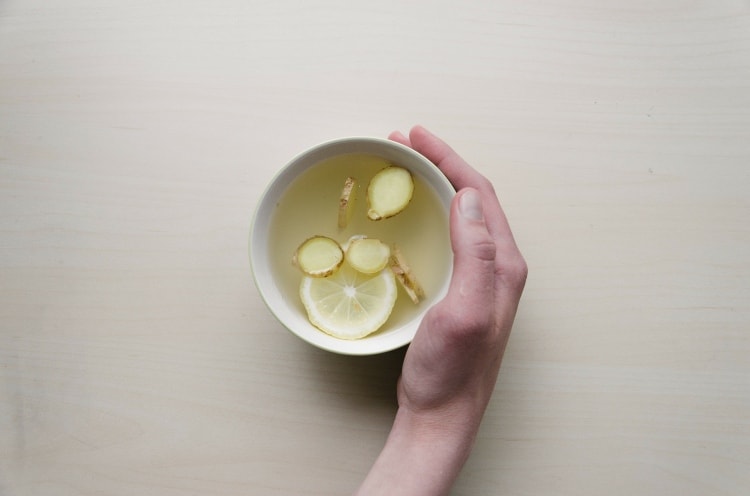14 Amazing Benefits of Ginger Tea and 4 Ways to Make Some
Changing seasons bring cold and flu with them. Sniffles and sore throats can be seen at school, universities and work places. As influenza is viral, medicines can only be of so much help. Many people turn to home remedies such as soup and herbal tea for comfort. Ginger tea is also a very effective home remedy against flu and many other ailments. Its benefits range from relieving stress to its potent anti carcinogenic properties.
What is ginger tea?
Ginger tea is a spicy traditional beverage that is not only used and enjoyed daily throughout Asia but is also popular across the world.
Ginger has been in use in ancient cultures such as China for more than three thousand years and tea prepared from ginger is used as a natural therapy to heal different ailments including indigestion, inflammation, migraines, motion sickness, digestive disturbances and several other diseases and conditions (1).
The history of Ginger (Zingiber officinalis) can be traced back to almost five thousand years ago. Ginger had its origins in South East Asia but has long been cultivated in other countries. It was also used by ancient Romans for its medicinal properties.
Ginger is an expensive root cultivated in warm weather hailing from the same family as nutmeg and saffron. It is light brown in color with a distinctive taste and nutrients that make it a much-desired herb due to high levels of vitamin C, magnesium and other minerals.

Ginger tea is prepared in different ways over the globe. It is usually steeped with brown sugar in China while made with ginger sweetened and preserved in honey in Korea. Its taste is brilliantly enhanced when served with honey, lemon juice or peppermint.
Ginger root tea is loaded with potassium and magnesium, vitamins B6 and C, and it has many essential oils such as gingerol, shogaol, farnesene, zingerone, and some β-phelladrene, cineol, and citral that are valuable to health.
The strong taste of ginger might be abhorrent to many but you can add peppermint, honey or lemon to mask the taste. The benefits of ginger tea are well known and include treatment and cures for some common conditions.
How to make ginger tea
There are many recipes to prepare ginger tea. You can combine ginger with other herbs to achieve a pleasant taste. Mix ginger, peppermint and green tea to prepare a healthy elixir.
Ginger tea recipe no. 1
In one liter of water add chunks of chopped ginger (about 200 grams) with a tablespoon of cinnamon.
Bring this mixture to boil for fifteen to twenty minutes.
Add honey as a sweetening agent. This recipe is especially beneficial for patients with sore throat. Insert a lemon wedge for decoration and additional flavor.
Ginger tea recipe no. 2
Take a piece of ginger about two to three inches large, peel it and chop it finely.
Put a utensil filled with about 800 ml of water for boiling and add ginger to it. Allow it to infuse for five minutes and then filter the content. To mask the bitter taste, add sugar or honey according to your preference.
Ginger tea recipe no. 3
Fill a pot with five hundred milliliters of water; add chunks of ginger and one or two tea bags.
You can sweeten with honey or sugar to taste and decorate it with a lemon wedge or slice.
Ginger tea recipe no. 4
Serves: One to two persons.
Ingredients
- One table spoon fresh grated ginger
- Two cups filtered water
- One table spoon of raw honey or pure maple syrup
- Half lemon, juiced (optional)
- One cinnamon stick
- Chamomile flowers
- Echinacea tincture
- Fresh mint leaves
- Pinch of cayenne pepper
Directions
Remove ginger skin using a knife or peeler.
Grate it with a grater or zester. If you slice it, slice it finely and a large amount into the brew.
Infuse the ginger; add other spices like cinnamon for additional taste.
If you are using a saucepan, bring the water to a boil, put ginger in and turn off heat. Put the lid on it and let it steep for ten minutes.
If you have a tea pot, add ginger in the teapot and pour boiling water in it. Let it steep for about ten minutes.
If you are preparing tea in a saucepan, strain the water to remove the ginger.
Add fresh lemon juice and natural sweetener if you like. Stir and enjoy this soothing beverage.
If you prefer your tea cold, let your tea cool down, keep it in fridge for some time and add ice cubes before serving.
Preparing ginger tea at home from scratch is practically an effortless process, since it only requires two basic ingredients: sliced ginger root and hot water.
It is up to you to add rest of ingredients to bring additional flavor or a splash of lemon juice. Echinacea tincture, chamomile flowers, cinnamon, cayenne pepper, can be also be added to the tea.
Don’t add everything together — try out different flavor combinations.
Among utensils you will require a grater or zester, as well as a kettle or a saucepan to boil the water and use a strainer to filter out peels from the tea if you are not using a kettle that has one in it.
Grating ginger instead of slicing it releases more aroma and flavors. Don’t juice ginger, keep the process simple.
There is no need to buy generic, prepackaged, dry ginger tea when you can make the fresh, hassle-free version.
While you can scrape the skin off the ginger with a knife or spoon, adding peel is more beneficial and it can be strained with a tea strainer. Easy peasy.
When is the right time to drink ginger tea?
When is the right time to drink ginger tea?
Ginger tea can be used round the clock, whether you are suffering from a cold, stomachache, migraines, or general fatigue.

Drinking ginger tea straight away revitalizes like a strong cup of coffee and comforts like a lavender salt bath.
Nutritional value of ginger tea
Ginger tea contains several anti-inflammatory and antioxidant substances valuable to health such as gingerols, beta-carotene, capsaicin, caffeic acid, curcumin and salicylate.
Ginger tea provides a variety of vitamins and minerals (2):
- Carbohydrates - 17.77 g
- Dietary fiber - 2 g
- Protein - 1.82 g
- Sugars - 1.7 g
- Sodium - 13 mg
- Vitamin B6 - 0.16 mg
- Calcium - 16 mg
- Iron - 0.6 mg
- Vitamin C - 5 mg
- Potassium - 415 mg
- Magnesium - 43 mg
- Phosphorus - 34 mg
- Zinc - 0.34 mg
- Riboflavin - 0.034 mg
- Niacin - 0.75 mg
- Iron - 0.6 mg
14 health benefits of drinking ginger tea
Treating colds
Use of ginger herbal tea during flu and cold can be good for you particularly when you suffer from general breathing problems and respiratory ailments such as cough and stuffy nose. Ginger helps in loosening up phlegm and easing congestion as a result, you can achieve relief rapidly from troubled breathing. Besides this, it even fights allergy symptoms, treats permanent sneezing and hay fever. Ginger is packed with properties that will chase away the irritating stuffiness (3).
Relieves stress
Ginger tea has a refreshing effect on both body and mind. It provides stress relief and tension. A single cup of tea can considerably improve your mood. It gives a relaxing feeling of freshness. Whenever you are feeling stressed out or blue, make brew up some ginger tea to soothe those frazzled nerves.
Fights cancer and chemotherapy induced nausea
Ginger has anti carcinogenic traits and has been observed to fight some types of cancer, including ovarian cancer. Research has shown that ginger tea can act to literally eliminate ovarian cancer cells. Even more promising is the fact that cancer cells actually end up killing and attacking themselves. This is good news for those already facing cancer, and incentive enough to make ginger tea a regular part of your diet if you are currently cancer-free. Aside from helping to treat ovarian cancer, ginger is also affective in combat against colon cancer. Studies have shown that ginger hinders the production of colorectal cancer cells (4). Last but not least ginger proves effective in fighting the chemotherapy induced nausea (5).
Helps with irritable bowel syndrome
Patients suffering from IBS have reported alleviation in symptoms after using ginger tea.
Muscular pain relief
Ginger has anti-inflammatory characteristics and may help treat muscle pain experienced after exercise, according to an article printed in "The Journal of Pain" in 2010. Subjects participated in weight-training exercise to induce muscle soreness and were then given either raw ginger, heated ginger or a placebo. Researchers noted and recorded pain intensity over the following three days and observed that participants who took raw or heated ginger experienced lesser pain than those who took placebo medication. Therefore, drinking ginger tea after rigorous work outs may help you overcome muscle tenderness (6, 14).
Useful for dysmenorrhoea
Ginger tea provides comfort and relief to women who suffer from severe menstrual cramps. According to a study published in "BMC Complementary and Alternative Medicine" in 2012, researchers followed one hundred and twenty students who had dysmenorrhea, suffering from painful cramps in abdomen or back during periods. Students who participated in this study were given either ginger tea or a placebo three times per day and reported their pain intensity and duration during menstruation. Those who took ginger tea experienced lesser pain intensity (7, 8, 9).
Treat nausea and travel sickness
One of the most popular medicinal benefits of ginger tea is its effect to provide relief from nausea. A cup of tea before traveling can thwart nausea caused by motion sickness. Ginger tea is excellent for pregnant women suffering from morning sickness (10).
Improves blood circulation
Vitamins, minerals and amino acids present in ginger tea improve blood circulation and decrease the risk of cardiovascular diseases (11). Ginger tea also prevents formation of plaque in artery walls and considerably reduces the risk of heart attack or stroke.
Improves digestion
Ginger tea boosts up speed of food digestion and improves nutrient absorption and uptake. It also reduces bloating caused by fast food, salty foods and overeating. Ginger tea also regulates your appetite (12).
Relieves migraine
Ginger tea is very efficient in relieving migraine. A cup of this healthy beverage will significantly reduce chronic inflammation, which is the main causative factor for the occurrence of migraine (13).
Alleviates symptoms of arthritis
Ginger has a strong anti-inflammatory effect, and consumption of ginger tea helps relieve joint pain that causes arthritis. Research studies suggest that ginger root impedes synthesis of inflammatory prostaglandins, by inhibiting both the cyclo-oxygenase and 5-lipoxygenase enzymes.
Studies also revealed that an extract of ginger root immobilizes several genes that contribute to inflammation. In an arthritis study, 6-gingerol was shown to markedly inhibit the release of nitric oxide, a highly reactive nitrogen molecule that quickly forms a very injurious free radical called peroxynitrite.
It was reported in article “Arthritis and Rheumatism”, Nov 2001 that ginger root can lessen the pain and suffering of people who have osteoarthritis as efficiently as conventional medications or painkillers. A special ginger root extract combined with glucosamine worked as well as the anti-inflammatory drug diclofenac (14).
Increases fertility
In ancient days, ginger was used as an aphrodisiac. Also, it is deemed useful in increasing fertility in men. Some studies have shown that consuming ginger tea regularly can increase the concentration of sperm and help in cases of erectile dysfunction (15, 16).
Adrenal glands
When adrenal glands in our endocrine system become fatigued as a result of long time stress, ginger can help heal them. Among its numerous benefits for the adrenal glands, ginger tea balances cortisol stress hormone levels, brings blood pressure to normal level, regulates the body’s metabolic rate and elevates energy (17).
Improves immune system
Drinking ginger tea regularly boosts immune system of our body since it contains huge amount of antioxidants that flush out toxins. It enhances the capability of our body to fight infection and disease and regulates cholesterol levels (18).
Side effects of ginger tea
Like all other home remedies and medicines, ginger tea can be harmful in large amounts and has its fair share of potential side effects. One of the most important precautions that you must exercise while consuming ginger tea, is that you need to have a safe amount of it, according to the needs of your body.
The adverse effect of most botanical medicines, particularly in the form of herbs and roots, is that there is a potential risk that these can react with medications. It is therefore advisable to consult a diet and nutritionist before you start consuming several cups of ginger tea on a daily basis.
Ginger tea has adverse reactions with medicines that are prescribed in order to cure bleeding. Medicines such as aspirin and other anti-inflammatory drugs also interact with ginger tea, thereby causing internal bleeding. If you are pregnant, nursing an infant, have gallstones, some form of cardiac disease or diabetes, take your doctor’s opinion before consuming ginger tea.
Increased bleeding
Ginger tea increases circulation and stimulates blood flow while preventing blood clotting. It could amplify your risk of bleeding, especially if you have a bleeding disorder or are taking any medications that slow down blood clotting.

Drinking ginger tea is not advised in last weeks of pregnancy due to increased risk of bleeding. According to an article published in 2007 in Der Anesthesist, consuming ginger tea near time of surgery is also a risk for increased bleeding. If you are about to undergo surgery, stop drinking ginger tea two weeks prior to it (19, 20).
Appetite suppression
A research study published in "Metabolism: Clinical and Experimental" in 2012 found that ginger caused appetite loss and increased feelings of satiety in overweight men. The study researchers postulated that ginger's ability to alter concentrations of the hormone serotonin may play a role in appetite loss. If you are trying to gain a few pounds, be aware that drinking ginger tea may possibly reduce your appetite (21).
Digestive ailments
Use ginger tea in limited quantity. Over dosage of ginger tea affects the digestive system. In case of some people, excessive use may cause symptoms like belching, diarrhea, nausea, or bloating. Over use may also lead to production of acids in the human body, producing acidity. Moreover, while ginger certainly helps fighting diabetes (22) people suffering from diabetes should avoid excessive consumption of ginger in any form, as it can lower your blood sugar level and cause hypoglycemia.
Adverse interaction with anesthesia
Consumption of ginger tea for a long period of time or just before surgery can lead to complications. Some medications administered for anesthesia are found to react with ginger tea, leading to complications, such as problem in healing of wounds, or photosensitive reactions and excessive bleeding; as a result of interaction with anticoagulants. Which is why, most doctors advice to stop the intake of ginger tea at least two weeks prior to surgery (23).
Side effects in patients with blood disorders
Ginger tea might cause hindrance in functioning of platelets that are responsible for the coagulation of blood. Use of excessive ginger tea is also related to bleeding risks and disorders. Drinking ginger tea can lead to gastrointestinal bleeding. Patients who suffer from blood disorders such as hemophilia should consult their doctor before consuming this tea. Blood thinners (Warfarin), which are prescribed for some blood-related disorders are known to interact with ginger in a harmful manner. Also, patients suffering from hypertension and using medication for high blood pressure should not drink ginger tea, as it tends to lower blood pressure and causes heart palpitations.
Consuming ginger tea during pregnancy
Pregnant women are advised against consuming ginger tea as it is rumored to be toxic for them and unborn baby. However, some doctors prescribe ginger tea as a remedy for morning sickness in early trimesters (24). The issue remains debatable; but it is best not to take a chance. Therefore, to be on the safer side, it is best not to consume ginger tea, or an excessive amount of ginger in any form during pregnancy. Should you choose to use it, do take advice of your care specialist or gynecologist before going forward (25).
Unsafe for nursing mothers
In several cases, ginger tea has been observed to be harmful for nursing mothers. Consult your doctor and use ginger tea during breast feeding only if your medical condition and health allows it and has no certain adverse effects for the baby (25).
Heartburn
Ginger tea, if consumed in copious amounts, can lead to heartburn and acidity inside the body. This is the reason why people suffering from certain health conditions such as stomach ulcers, inflammatory bowel disease, etc., are strictly advised not to consume ginger as it can exaggerate the problem (26).
Inflammation of mouth
Among botanical medicines, ginger tea has a warming effect and it causes the inside of body to generate more heat. This can cause mouth and mucous membranes to become inflamed, which can be irritating. If you find consuming ginger tea uncomfortable, avoid drinking it.
What to remember?
While ginger tea has lots of benefits in fighting cold, cancer, digestive issues, menstrual cramps. musculoskeletal and arthritis pain, as well as migraines, it also has some side effects. Patients suffering from diabetes should only take ginger on advice of their physician. Also people suffering from blood disorders should be very careful and not to drink ginger tea without prior consent of their physician due to its effects on blod clotting properties. While ginger tea may help fight pregnancy related nausea, it should not be drunk by breast feeding women as well as in late stages of pregnancy. If you have any querries concerning suitability of ginger tea for you, always ask your physician for help and advice.
| Written by: | Michal Vilímovský (EN) |
|---|---|
| Education: | Physician |
| Article resources: | See numbered scientific references within the article. |
| Image resources: | Dollarphotoclub.com and Pixabay.com |
| Published: | December 27, 2015 at 12:45 AM |
| Next scheduled update: | December 27, 2017 at 12:45 AM |
Get more articles like this in your inbox
Sign up for our daily mail and get the best evidence based health, nutrition and beauty articles on the web.


Ache in left arm that you should not ignore
Alkaline water dangers: why you should not drink it
How to Avoid Sleepiness While Studying?
23 Foods That Increase Leptin Sensitivity
Low dopamine (e.g. dopamine deficiency): causes, symptoms, diagnosis and treatment options
Swollen taste buds: the ultimate guide to causes, symptoms and treatment
Thin endometrial lining: causes, symptoms, diagnosis and treatment
Pimples inside nose: the complete guide
Holes in tonsils: definition, symptoms, treatment and prevention
How to deal with an ingrown hair cyst
Allegra vs. Zyrtec vs. Claritin
Allergy to penicillin and alternative antibiotics
How to get rid of phlegm (excessive mucus) in throat? Detailed guide to medical and home remedies, symptoms and causes
What causes stomach ache after meals?
Liver blood test results explained